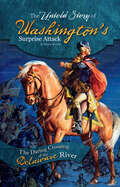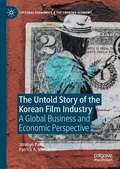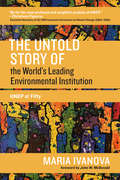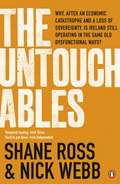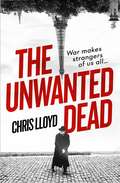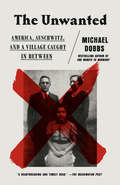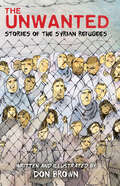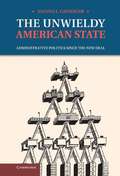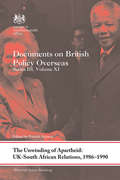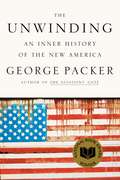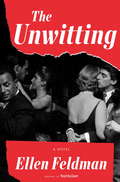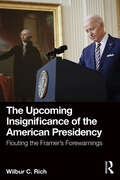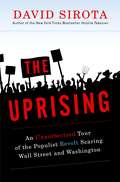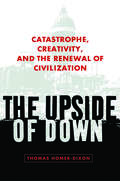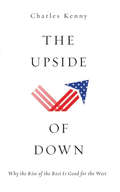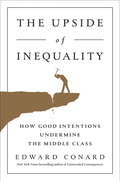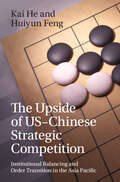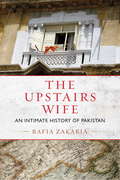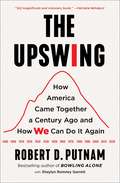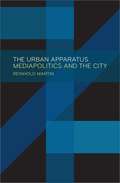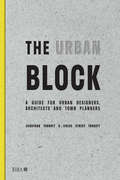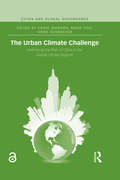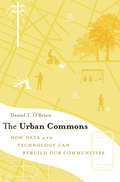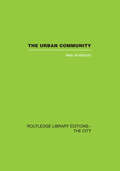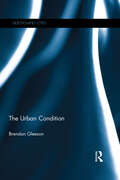- Table View
- List View
The Untold Story of Washington's Surprise Attack: The Daring Crossing Of The Delaware River (What You Didn't Know About The American Revolution Ser.)
by Danny KravitzThe Untold Story of the Korean Film Industry: A Global Business and Economic Perspective (Cultural Economics & the Creative Economy)
by Jimmyn Parc Patrick A. MesserlinThis book analyses the Korean film industry emergence and development in a global business and economic perspective. This is one of the first books to compare the film policies and industries of the world’s six largest film industries – featuring Korea as the central character – with the aim of defining the contours of what constitutes an effective film policy. It presents many cases showing that, contrary to what is often believed, an economically sound policy is a good instrument for achieving desired cultural goals. It uses a set of analytical tools – borrowed from the economic analysis of international trade policies – to provide a rich harvest of new, rigorous, and often unexpected results on the effectiveness of the existing film policies. The implications found in this book are relevant not only for Korea, but for all other countries that wish to foster or enhance the competitiveness of their film industries. This book will be of interest to a wide spectrum of scholars interested in cultural studies – media and cultural specialists, political scientists, sociologists, historians – in addition to business analysts and economists specialized in cultural economics. As this book focuses on film policies and how to improve them, it will also appeal to policymakers, business figures, public relations officials, and staff from international organizations working on the film industry.
The Untold Story of the Worlds Leading Environmental Institution: UNEP at Fifty (One Planet)
by Maria IvanovaThe past, present, and possible future of the agency designed to act as "the world's environmental conscience."The United Nations Environmental Programme (UNEP) was founded in 1972 as a nimble, fast, and flexible entity at the core of the UN system--a subsidiary body rather than a specialized agency. It was intended to be the world's environmental conscience, an anchor institution that established norms and researched policy, leaving it to other organizations to carry out its recommendations. In this book, Maria Ivanova offers a detailed account of UNEP's origin and history. Ivanova counters the common criticism that UNEP was deficient by design, arguing that UNEP has in fact delivered on much (though not all) of its mandate.
The Untouchables: The people who helped wreck Ireland - and are still running the show
by Nick Webb Shane RossA devastating new exposé from the bestselling authors of The Bankers and Wasters.In March 2011, the Irish people elected a new government. But how much had really changed? In The Untouchables, Shane Ross and Nick Webb shine a light into dark corners of official Ireland to show that the blame for running the country into the ground goes well beyond Fianna Fáil, and that a dismaying number of the people who should share the blame are still in situ: in the civil service, on the boards of the leading companies, and in the banks, law firms, and consultancies that carry so much influence in deciding who wins and who loses. They name names, trace connections, and show how the untouchables managed to do so much damage, how they got away with it, and how so many of them are still in positions of power and influence in Ireland.'Fascinating ... required reading for anyone interested in how crony capitalism and power work in practice in Ireland' Irish Times'The Untouchables is hard to put down. Read it and seethe.' Irish IndependentShane Ross is an independent TD for Dublin South, and columnist in the Sunday Independent. Nick Webb is business editor of the Sunday Independent. They are the authors of Wasters, 2010's top-selling Irish current affairs title.
The Unwanted Dead
by Chris Lloyd'A gripping murder mystery and a vivid recreation of Paris under German Occupation.' ANDREW TAYLOR'Terrific' SUNDAY TIMES, Best Books of the Month'A thoughtful, haunting thriller' MICK HERRON'Sharp and compelling' THE SUN* * * * *Paris, Friday 14th June 1940.The day the Nazis march into Paris, making headlines around the globe.Paris police detective Eddie Giral - a survivor of the last World War - watches helplessly on as his world changes forever.But there is something he still has control over. Finding whoever is responsible for the murder of four refugees. The unwanted dead, who no one wants to claim.To do so, he must tread carefully between the Occupation and the Resistance, between truth and lies, between the man he is and the man he was.All the while becoming whoever he must be to survive in this new and terrible order descending on his home...* * * * *'Lloyd's Second World War Paris is rougher than Alan Furst's, and Eddie Giral, his French detective, is way edgier than Philip Kerr's Bernie Gunther ... Ranks alongside both for its convincingly cloying atmosphere of a city subjugated to a foreign power, a plot that reaches across war-torn Europe and into the rifts in the Nazi factions, and a hero who tries to be a good man in a bad world. Powerful stuff.'THE TIMES'Excellent ... In Eddie Giral, Lloyd has created a character reminiscent of Philip Kerr's Bernie Gunther, oozing with attitude and a conflicted morality that powers a complex, polished plot. Historical crime at its finest.'VASEEM KHAN, author of Midnight at Malabar House'Monumentally impressive ... A truly wonderful book. If somebody'd given it to me and told me it was the latest Robert Harris, I wouldn't have been surprised. Eddie Giral is a wonderful creation.'ALIS HAWKINS'A terrific read - gripping and well-paced. The period atmosphere is excellent.'MARK ELLIS'The best kind of crime novel: gripping, thought-provoking and moving. In Detective Eddie Giral, Chris Lloyd has created a flawed hero not just for occupied Paris, but for our own times, too.'KATHERINE STANSFIELD
The Unwanted: America, Auschwitz, and a Village Caught In Between
by Michael DobbsPublished in association with the United States Holocaust Memorial Museum, a riveting story of Jewish families seeking to escape Nazi GermanyIn 1938, on the eve of World War II, the American journalist Dorothy Thompson wrote that "a piece of paper with a stamp on it" was "the difference between life and death." The Unwanted is the intimate account of a small village on the edge of the Black Forest whose Jewish families desperately pursued American visas to flee the Nazis. Battling formidable bureaucratic obstacles, some make it to the United States while others are unable to obtain the necessary documents. Some are murdered in Auschwitz, their applications for American visas still "pending."Drawing on previously unpublished letters, diaries, interviews, and visa records, Michael Dobbs provides an illuminating account of America's response to the refugee crisis of the 1930s and 1940s. He describes the deportation of German Jews to France in October 1940, along with their continuing quest for American visas. And he re-creates the heated debates among U.S. officials over whether or not to admit refugees amid growing concerns about "fifth columnists," at a time when the American public was deeply isolationist, xenophobic, and antisemitic.A Holocaust story that is both German and American, The Unwanted vividly captures the experiences of a small community struggling to survive amid tumultuous world events.
The Unwanted: Stories of the Syrian Refugees
by Don BrownSibert Honor Medalist · New York Public Library Best Of 2018 · The Horn Book&’s Fanfare 2018 list · Kirkus Best Books of 2018 · YALSA Excellence in Nonfiction WinnerIn the tradition of two-time Sibert honor winner Don Brown&’s critically acclaimed, full-color nonfiction graphic novels The Great American Dust Bowl and Drowned City, The Unwanted is an important, timely, and eye-opening exploration of the ongoing Syrian refugee crisis, exposing the harsh realities of living in, and trying to escape, a war zone. Starting in 2011, refugees flood out of war-torn Syria in Exodus-like proportions. The surprising flood of victims overwhelms neighboring countries, and chaos follows. Resentment in host nations heightens as disruption and the cost of aid grows. By 2017, many want to turn their backs on the victims. The refugees are the unwanted. Don Brown depicts moments of both heartbreaking horror and hope in the ongoing Syrian refugee crisis. Shining a light on the stories of the survivors, The Unwanted is a testament to the courage and resilience of the refugees and a call to action for all those who read.
The Unwieldy American State
by Joanna L. GrisingerThe Unwieldy American State offers a political and legal history of the administrative state from the 1940s through the early 1960s. After Progressive Era reforms and New Deal policies shifted a substantial amount of power to administrators, the federal government's new size and shape made one question that much more important: how should agencies and commissions exercise their enormous authority? In examining procedural reforms of the administrative process in light of postwar political developments, Grisinger shows how administrative law was shaped outside the courts. Using the language of administrative law, parties debated substantive questions about administrative discretion, effective governance, and national policy and designed reforms accordingly. In doing so, they legitimated the administrative process as a valid form of government.
The Unwinding of Apartheid: Documents on British Policy Overseas, Series III, Volume XI (Whitehall Histories)
by Patrick Salmon Martin JewittThis volume examines diplomatic relations between the United Kingdom and South Africa from 1986 to 1990, when deadlock gave way to the first stages in the unwinding of This volume examines diplomatic relations between the United Kingdom and South Africa from 1986 to 1990, when deadlock gave way to the first stages in the unwinding of apartheid. By the middle of 1986, the South African Government had succeeded in containing the township revolt, but its hesitant moves towards reform had brought the end of apartheid no closer. The intransigent figure of President P.W. Botha ensured a continuing stalemate until his reluctant departure from office in August 1989. The subsequent election of F.W. de Klerk marked the beginning of irrevocable change, symbolised by the release of Nelson Mandela from prison in February 1990. This volume documents the role of the United Kingdom in keeping pressure on the South African Government, building contacts with the African National Congress (ANC) and giving decisive encouragement to President de Klerk’s reform initiatives. It reveals recurrent differences of approach between the Foreign and Commonwealth Office and Prime Minister Margaret Thatcher. However, it also shows that despite her frequent confrontations with the international community in general, and the Commonwealth in particular, Mrs Thatcher repeatedly brought pressure to President Botha and strongly supported President de Klerk during his first crucial months in office. Her part in bringing about change in South Africa was fully appreciated by Nelson Mandela, whose first meeting with Mrs Thatcher concludes the volume. This book will be of much interest to students of British politics, African studies, foreign policy and International Relations in general..
The Unwinding: An Inner History of the New America, First Edition
by George PackerA riveting examination of a nation in crisis, from one of the finest political journalists of our generation.<P><P> American democracy is beset by a sense of crisis. Seismic shifts during a single generation have created a country of winners and losers, allowing unprecedented freedom while rending the social contract, driving the political system to the verge of breakdown, and setting citizens adrift to find new paths forward. In The Unwinding, George Packer, author of The Assassins' Gate: America in Iraq, tells the story of the United States over the past three decades in an utterly original way, with his characteristically sharp eye for detail and gift for weaving together complex narratives.<P> The Unwinding journeys through the lives of several Americans, including Dean Price, the son of tobacco farmers, who becomes an evangelist for a new economy in the rural South; Tammy Thomas, a factory worker in the Rust Belt trying to survive the collapse of her city; Jeff Connaughton, a Washington insider oscillating between political idealism and the lure of organized money; and Peter Thiel, a Silicon Valley billionaire who questions the Internet's significance and arrives at a radical vision of the future. Packer interweaves these intimate stories with biographical sketches of the era's leading public figures, from Newt Gingrich to Jay-Z, and collages made from newspaper headlines, advertising slogans, and song lyrics that capture the flow of events and their undercurrents.<P> The Unwinding portrays a superpower in danger of coming apart at the seams, its elites no longer elite, its institutions no longer working, its ordinary people left to improvise their own schemes for success and salvation. Packer's novelistic and kaleidoscopic history of the new America is his most ambitious work to date. <P>National Book Award 2013
The Unwitting: A Novel
by Ellen FeldmanIn CIA parlance, those who knew were "witting." Everyone else was among the "unwitting." On a bright November day in 1963, President Kennedy is shot. That same day, Nell Benjamin receives a phone call with news about her husband, the influential young editor of a literary magazine. As the nation mourns its public loss, Nell has her private grief to reckon with, as well as a revelation about Charlie that turns her understanding of her marriage on its head, along with the world she thought she knew. With the Cold War looming ominously over the lives of American citizens in a battle of the Free World against the Communist powers, the blurry lines between what is true, what is good, and what is right tangle with issues of loyalty and love. As the truths Nell discovers about her beloved husband upend the narrative of her life, she must question her own allegiance: to her career as a journalist, to her country, but most of all to the people she loves. Set in the literary Manhattan of the 1950s, at a journal much like the Paris Review, The Unwitting evokes a bygone era of burgeoning sexual awareness and intrigue and an exuberance of ideas that had the power to change the world. Resonant, illuminating, and utterly absorbing, The Unwitting is about the lies we tell, the secrets we keep, and the power of love in the face of both.
The Upcoming Insignificance of the American Presidency: Flouting the Framer's Forewarnings
by Wilbur C. RichThis new text analyzes the development of the presidency as the dominant political institution in the United States and raises questions about its future relevance. In this history of the U.S. executive branch from the framing of the Constitution to the Biden administration, author Wilbur C. Rich illuminates the transformation of the presidential role by a variety of extra-constitutional, non-legal forces, technology, and social changes.The book highlights how some presidents nevertheless have managed to maintain relevancy and dominance by adapting to these changes or by introducing changes of their own. For undergraduate students and researchers of presidential history and American political development, this expansive historical overview of the executive branch in America makes a strong case that the significance of the American presidency has declined dramatically—and perhaps irrevocably—in the modern presidency.
The Uprising: An Unauthorized Tour of the Populist Revolt Scaring Wall Street and Washington
by David Sirota[From the book jacket] An All-Access Pass to the Populist Insurrection Brewing Across the Country Job outsourcing. Perpetual busy signals at government agencies. Slashed paychecks. Stolen elections. A war without end, fatally mismanaged. Ordinary Americans on both the Right and Left are tired of being disenfranchised by corrupt politicians of both parties and are organizing to change the status quo. In his invigorating new book, David Sirota investigates whether this uprising can be transformed into a unified, lasting political movement. Throughout the course of American history, uprisings like the one we are seeing now have given birth to powerful movements to end wars, protect workers, and expand civil rights, so the prospect of today's uprising turning into a full- fledged populist movement terrifies Wall Street and Washington. In The Uprising, Sirota takes us far from the national media spotlight into the trenches where real change is happening - from the headquarters of the most powerful third party in America to the bowels of the U.S. Senate; from the auditorium of an ExxonMobil shareholder meeting to the quasi-military staging area of a vigilante force on the Mexican border. This is vital, on-the-ground reporting that immerses us in the tumultuous give-and-take of politics at its most personal. Sirota also offers a biting critique of our politics. He shows how the uprising is, at its core, a reaction to faux "bipartisanship" in the nation's capital - the "bipartisanship" whereby Republican and Democratic lawmakers join together in putting the agenda of corporate interests above all those of ordinary citizens. Ultimately, Sirota reminds us that the Declaration of Independence, "America's original uprising manifesto," says that governments "derive their powers from the consent of the governed." Irreverent and insightful, The Uprising shows how the governed have stopped consenting and have started taking action.
The Upside of Down: Catastrophe, Creativity, and the Renewal of Civilization
by Thomas Homer-DixonEnvironmental disasters. Terrorist wars. Energy scarcity. Economic failure. Is this the world's inevitable fate, a downward spiral that ultimately spells the collapse of societies? Perhaps, says acclaimed author Thomas Homer-Dixon - or perhaps these crises can actually lead to renewal for ourselves and planet earth. The Upside of Down takes the reader on a mind-stretching tour of societies' management, or mismanagement, of disasters over time. From the demise of anciRome to contemporary climate change, this spellbinding book analyzes what happens when multiple crises compound to cause what the author calls "synchronous failure." But, crisis doesn't have to mean total global calamity. Through catagenesis, or creative, bold reform in the wake of breakdown, it is possible to reinvour future. Drawing on the worlds of archeology, poetry, politics, science, and economics, The Upside of Down is certain to provoke controversy and stir imaginations across the globe. The author's wide-ranging expertise makes his insights and proposals particularly acute, as people of all nations try to grapple with how we can survive tomorrow's inevitable shocks to our global system. There is no guarantee of success, but there are ways to begin thinking about a better world, and The Upside of Down is the ideal place to start thinking.
The Upside of Down: Why the Rise of the Rest is Good for the West
by Charles KennyAmerica is in decline, and the rise of the East suggests a bleak future for the worldOCOs only superpower ? so goes the conventional wisdom. But what if the traditional measures of national status are no longer as important as they once were? What if AmericaOCOs well-being was assessed according to entirely different factors? In "The Upside of Down," Charles Kenny argues that AmericaOCOs so-called decline is only relative to the newfound success of other countries. And there is tremendous upside to life in a wealthier world: Americans can benefit from better choices and cheaper prices offered by schools and hospitals in rising countries, and, without leaving home, avail themselves of the new inventions and products those countries will produce. The key to thriving in this world is to move past the jeremiads about AmericaOCOs deteriorating status and figure out how best to take advantage of its new role in a multipolar world. A refreshing antidote to prophecies of American decline, "The Upside of Down" offers a fresh and highly optimistic look at AmericaOCOs future in a wealthier world. "
The Upside of Inequality: How Good Intentions Undermine the Middle Class
by Edward ConardThe scourge of America’s economy isn't the success of the 1 percent—quite the opposite. The real problem is the government’s well-meaning but misguided attempt to reduce the payoffs for success. Four years ago, Edward Conard wrote a controversial bestseller, Unintended Consequences, which set the record straight on the financial crisis of 2008 and explained why U.S. growth was accelerating relative to other high-wage economies. He warned that loose monetary policy would produce neither growth nor inflation, that expansionary fiscal policy would have no lasting benefit on growth in the aftermath of the crisis, and that ill-advised attempts to rein in banking based on misplaced blame would slow an already weak recovery. Unfortunately, he was right. Now he’s back with another provocative argument: that our current obsession with income inequality is misguided and will only slow growth further. Using fact-based logic, Conard tracks the implications of an economy now constrained by both its capacity for risk-taking and by a shortage of properly trained talent—rather than by labor or capital, as was the case historically. He uses this fresh perspective to challenge the conclusions of liberal economists like Larry Summers and Joseph Stiglitz and the myths of “crony capitalism” more broadly. Instead, he argues that the growing wealth of most successful Americans is not to blame for the stagnating incomes of the middle and working classes. If anything, the success of the 1 percent has put upward pressure on employment and wages. Conard argues that high payoffs for success motivate talent to get the training and take the risks that gradually loosen the constraints to growth. Well-meaning attempts to decrease inequality through redistribution dull these incentives, gradually hurting not just the 1 percent but everyone else as well. Conard outlines a plan for growing middle- and working-class wages in an economy with a near infinite supply of labor that is shifting from capital-intensive manufacturing to knowledge-intensive, innovation-driven fields. He urges us to stop blaming the success of the 1 percent for slow wage growth and embrace the upside of inequality: faster growth and greater prosperity for everyone.From the Hardcover edition.
The Upside of US-Chinese Strategic Competition: Institutional Balancing and Order Transition in the Asia Pacific
by Kai He Huiyun FengUS–Chinese strategic competition is a defining factor in world politics. The prevailing narrative on US–China relations predicts inevitable conflicts between these two giants, potentially leading to a self-fulfilling prophecy. While fully acknowledging the inherent dangers of potential wars or military conflicts between the two powers, this book shows that competition is not necessarily detrimental. By systematically examining US–China institutional balancing across security, economic and political domains, particularly in the aftermath of the 2008 global financial crisis, this book highlights three positive externalities or unintended consequences: the revitalisation of regional institutions to address emerging challenges, unexpected collaborations between great powers (the US and China) and regional actors, and the provision of public goods by both nations. The book argues that constructive and institutionalised competition between the US and China, if managed with strategic foresight and restraint, could inadvertently lead to positive outcomes – institutional peace – in the Asia-Pacific region.
The Upstairs Wife
by Rafia ZakariaA memoir of Karachi through the eyes of its women An Indies Introduce Debut Authors Selection For a brief moment on December 27, 2007, life came to a standstill in Pakistan. Benazir Bhutto, the country's former prime minister and the first woman ever to lead a Muslim country, had been assassinated at a political rally just outside Islamabad. Back in Karachi--Bhutto's birthplace and Pakistan's other great metropolis--Rafia Zakaria's family was suffering through a crisis of its own: her Uncle Sohail, the man who had brought shame upon the family, was near death. In that moment these twin catastrophes--one political and public, the other secret and intensely personal--briefly converged. Zakaria uses that moment to begin her intimate exploration of the country of her birth. Her Muslim-Indian family immigrated to Pakistan from Bombay in 1962, escaping the precarious state in which the Muslim population in India found itself following the Partition. For them, Pakistan represented enormous promise. And for some time, Zakaria's family prospered and the city prospered. But in the 1980s, Pakistan's military dictators began an Islamization campaign designed to legitimate their rule--a campaign that particularly affected women's freedom and safety. The political became personal when her aunt Amina's husband, Sohail, did the unthinkable and took a second wife, a humiliating and painful betrayal of kin and custom that shook the foundation of Zakaria's family but was permitted under the country's new laws. The young Rafia grows up in the shadow of Amina's shame and fury, while the world outside her home turns ever more chaotic and violent as the opportunities available to post-Partition immigrants are dramatically curtailed and terrorism sows its seeds in Karachi. Telling the parallel stories of Amina's polygamous marriage and Pakistan's hopes and betrayals, The Upstairs Wife is an intimate exploration of the disjunction between exalted dreams and complicated realities.From the Hardcover edition.
The Upswing: How America Came Together a Century Ago and How We Can Do It Again
by Robert D. PutnamAn eminent political scientist&’s brilliant analysis of economic, social, and political trends over the past century demonstrating how we have gone from an individualistic &“I&” society to a more communitarian &“We&” society and then back again, and how we can learn from that experience to become a stronger, more unified nation—from the author of Bowling Alone and Our Kids.Deep and accelerating inequality; unprecedented political polarization; vitriolic public discourse; a fraying social fabric; public and private narcissism—Americans today seem to agree on only one thing: This is the worst of times. But we&’ve been here before. During the Gilded Age of the late 1800s, America was highly individualistic, starkly unequal, fiercely polarized, and deeply fragmented, just as it is today. However as the twentieth century opened, America became—slowly, unevenly, but steadily—more egalitarian, more cooperative, more generous; a society on the upswing, more focused on our responsibilities to one another and less focused on our narrower self-interest. Sometime during the 1960s, however, these trends reversed, leaving us in today&’s disarray. In a sweeping overview of more than a century of history, drawing on his inimitable combination of statistical analysis and storytelling, Robert Putnam analyzes a remarkable confluence of trends that brought us from an &“I&” society to a &“We&” society and then back again. He draws inspiring lessons for our time from an earlier era, when a dedicated group of reformers righted the ship, putting us on a path to becoming a society once again based on community. Engaging, revelatory, and timely, this is Putnam&’s most ambitious work yet, a fitting capstone to a brilliant career.
The Urban Apparatus: Mediapolitics and the City
by Reinhold MartinUrbanization is a system of power and knowledge, and today&’s city functions through the expansive material infrastructures of the urban order. In The Urban Apparatus, Reinhold Martin analyzes urbanization and the contemporary city in aesthetic, socioeconomic, and mediapolitical terms. He argues that understanding the city as infrastructure reveals urbanization to be a way of imparting functional, aesthetic, and cognitive order to a contradictory, doubly bound neoliberal regime.Blending critical philosophy, political theory, and media theory, The Urban Apparatus explores how the aesthetics of cities and their political economies overlap. In a series of ten essays, with a detailed theoretical introduction, Martin explores questions related to urban life, drawn from a wide range of global topics—from the fiscal crisis in Detroit to speculative development in Mumbai to the landscape of Mars, from discussions of race and the environment to housing and economic inequality. Each essay proposes a particular &“mediator&” (or a material complex) that is shaped by imaginative practices, each answering the question &“What is a city, today?&” The Urban Apparatus serves as an &“urban&” bookend to the architectural questions explored by Martin in his earlier book Utopia&’s Ghost, and ultimately offers readers a way to think politically about urbanization.
The Urban Block: A Guide for Urban Designers, Architects and Town Planners
by Jonathan Tarbatt Chloe Street TarbattThe block is no more than the land and building area defined by streets. It is the nature of the interface between the two, which has a critical impact on the quality of the spaces between those buildings. The importance of the block to city life is well rehearsed, and in any case, we seldom find ourselves in the business of making cities from scratch. But we are in the business of making new houses, neighbourhoods and new local centres, and we need lots of them: 250,000 a year to be imprecise. Against the background of a burgeoning housing shortage in the UK, there are varied issues to be reconciled. The Urban Block charts the fall and rise of the perimeter block as the staple of urban form and structure from ancient times. It takes you through the process of understanding, defining, structuring and designing the block. Carefully selected urban and suburban case examples explain “do's and don'ts” of good block layout and will help you to produce better masterplans, while staying in touch with commercial realities.
The Urban Climate Challenge: Rethinking the Role of Cities in the Global Climate Regime (Cities and Global Governance)
by Craig Johnson Noah Toly Heike SchroederDrawing upon a variety of empirical and theoretical perspectives, The Urban Climate Challenge provides a hands-on perspective about the political and technical challenges now facing cities and transnational urban networks in the global climate regime. Bringing together experts working in the fields of global environmental governance, urban sustainability and climate change, this volume explores the ways in which cities, transnational urban networks and global policy institutions are repositioning themselves in relation to this changing global policy environment. Focusing on both Northern and Southern experience across the globe, three questions that have strong bearing on the ways in which we understand and assess the changing relationship between cities and global climate system are examined. How are cities repositioning themselves in relation to the global climate regime? How are cities being repositioned - conceptually and epistemologically? What are the prospects for crafting policies that can reduce the urban carbon footprint while at the same time building resilience to future climate change? The Urban Climate Challenge will be of interest to scholars of urban climate policy, global environmental governance and climate change. It will be of interest to readers more generally interested in the ways in which cities are now addressing the inter-related challenges of sustainable urban growth and global climate change. Chapter 9 and Chapter 11 of this book is freely available as a downloadable Open Access PDF at www.tandfebooks.com/openaccess. It has been made available under a Creative Commons Attribution-Non Commercial-No Derivatives 3.0 license.
The Urban Commons: How Data and Technology Can Rebuild Our Communities
by Daniel T. O'BrienThrough voicemail, apps, websites, and Twitter, Boston’s sophisticated 311 system allows citizens to report potholes, broken streetlights, graffiti, and vandalism that affect everyone’s quality of life. Drawing on Boston’s rich data, Daniel T. O’Brien offers a model of what smart technology can do for cities seeking both growth and sustainability.
The Urban Condition (Questioning Cities)
by Brendan GleesonThis book will speak to the new human epoch, the Urban Age. A majority of humanity now lives for the first time in cities. The city, the highest invention of the modern age, is now the human heartland. And yet the same process that brought us the city and its wonders, modernisation, has also thrown up challenges and threats, especially climate change, resource depletion, social division and economic insecurity. This book considers how these threats are encountered and countered in the urban age, focusing on the issue of human knowledge and self-awareness, just as Hannah Arendt’s influential The Human Condition did half a century ago. The Human Condition is now The Urban Condition. And it is this condition that will define human prospects in an age of default and risk. Gleeson expertly explores the concept through three main themes. The first is an exploration of what defines the current human condition, especially the expanding cities that are at the heart of an over-consumptive world economic order. The second exposes and reviews the reawakening of forms of knowledge (‘naturalism’) that are likely to worsen not improve our comprehension of the crisis. The new ‘science of urbanism’ in popular new literature exemplifies this dangerous trend. The third and last part of the book considers prospects for a new urban, and therefore human, dispensation, ‘The Good City’. We must first journey in our urban vessels through troubled times. But can we now start to plot the way to new shores, to a safer, more resilient city that provides for human flourishing? The Urban Condition attempts this ideal, conceiving a new urbanism based on the old idea of self-limitation. The Urban Condition is an original, timely book that reconsiders and redeploys Arendt’s famous notion of The Human Condition in an age of cities and risk. It brings together several important strands of human consideration, urbanisation, climate threat, resource depletion, economic default and critical knowledge and weaves them into a new analysis of the times. It also looks to a future that is nearly with us—of changed climate, resource scarcity and economic stress. The book journeys into these troubled times, proposing the idea of Lifeboat Cities as a way of thinking about the human journey to come
